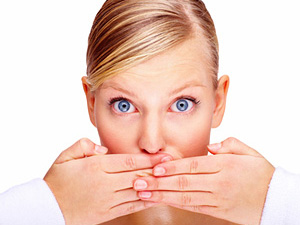
Bad Breath
Bad breath, or halitosis, is often embarrassing and unpleasant. While it's not necessarily a medical problem in itself, it can create significant issues in personal relationships, particularly in interactions with others.
Some people with bad breath may not even be aware of it.
If you think your breath smells bad or have been alerted to it, you should visit your dentist. They can help determine whether the problem originates in your mouth. Almost 90% of bad breath cases are caused by issues within the oral cavity.
What are the causes of bad breath?
-
Poor Oral Care: If teeth aren't brushed and flossed daily, bacteria build up on leftover food particles in the mouth, causing bad breath. The tongue is covered with tiny hair-like substances that can trap bacteria. Gum problems, poorly cleaned dentures, tooth decay, and tartar can also contribute to bad breath.
-
Dry Mouth: Medications and problems with salivary glands can cause dry mouth. We also experience dry mouth when we wake up in the morning. When saliva levels drop, the mouth doesn't clean itself properly. During sleep, decreased saliva secretion leaves food particles in the mouth, which bacteria consume and break down, leading to bad breath.
-
Foods like Garlic and Onion: These foods are absorbed into the bloodstream and travel to the lungs, causing bad breath until they are eliminated from the body. Brushing your teeth won't eliminate this odor for a while.
-
Smoking and Alcohol: Both contribute to bad breath.
-
Starving, Dieting, Fasting: Without liquid food, fat and protein break down in the body, leading to bad breath.
-
Medication Use: Some medications can cause bad breath, which you can discuss with your doctor.
-
Systemic Diseases:
- Chronic sinusitis
- Bronchitis
- Diabetes
- Kidney failure
- Liver failure
- Metabolic disorders
- Stomach problems, etc.
How can you get rid of bad breath?
Unfortunately, habits like regular dental visits and brushing teeth aren't well established in some countries for various reasons. Many of my patients are children, and I am saddened to see that they don't have a habit of brushing their teeth. Upon looking into the cause, I often find that their parents don't brush their teeth either. Children mimic their parents, and if parents don't have healthy oral habits, it's hard for children to develop them. This leads to bad breath. We should do our best to help children develop this habit, as explained in my previous article ("When should babies start brushing their teeth?").
Here are some steps to improve your oral hygiene and reduce bad breath:
-
Brush your teeth twice a day with fluoride toothpaste. Clean between your teeth with dental floss once daily. Don't forget to brush your tongue while brushing your teeth.
-
Visit the dentist regularly for check-ups. Regular tartar cleanings and addressing issues like cavities will help you avoid bad breath. If you use dentures or orthodontic appliances, clean them regularly.
-
Chew sugar-free gum to help freshen your breath. Avoid sugary gum or mints, as they can make the problem worse. Gum with cinnamon or xylitol is particularly beneficial.
-
Eat parsley as it contains chlorophyll, which is helpful for freshening breath. If you don't like eating parsley, you can buy parsley tablets at pharmacies.
-
Avoid using mouth sprays as they don't provide long-term relief. If you find yourself using them constantly, you should consult your doctor.
-
Reduce smoking and alcohol consumption, as both contribute to bad breath.
If you still experience bad breath despite these measures, the problem may be coming from somewhere outside of your mouth. In that case, you should see a doctor for further evaluation

 Türkçe
Türkçe English
English

Contact Form